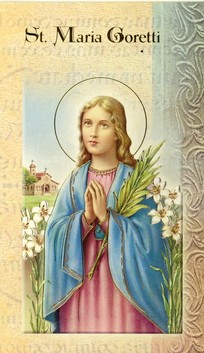
By the time she was six, her family had become so poor that they were forced to give up their farm, move, and work for other farmers. Soon, Maria's father Luigi became very sick with malaria, and died when Maria was just nine. While her brothers, mother, and sister worked in the fields, Maria would cook, sew, watch her infant sister, and keep the house clean. It was a hard life, but the family was very close. They shared a deep love and faith for God. She and her family moved to Le Ferriere, near modern Latina and Nettuno in Lazio, where they lived in a building, "La Cascina Antica," they shared with another family which included Giovanni Serenelli and his son, Alessandro.
On July 5, 1902, eleven-year-old Maria was sitting on the outside stairs of her home, sewing and watching her infant sister Teresa, while Alessandro was threshing beans in the barnyard. Knowing she would be alone, he returned to the house and threatened her with death if she did not do as he said; he was intending to rape her. She would not submit, however, protesting that what he wanted to do was a mortal sin and warning Alessandro that he would go to hell. She desperately fought to stop Alessandro, a 19-year-old farmhand, from abusing her. She kept screaming, "No! It is a sin! God does not want it!" Alessandro first choked Maria, but when she insisted she would rather die than submit to him, he stabbed her eleven times. The injured Maria tried to reach for the door, but Alessandro stopped her by stabbing her three more times before running away.
Teresa awoke with the noise and started crying, and when Serenelli's father and Maria's mother came to check on the little girl, they found the bleeding Maria and took her to the nearest hospital in Nettuno. She underwent surgery without anesthesia, but her injuries were beyond the doctors' help. Halfway through the surgery, Maria woke up. She insisted that it stay that way. The pharmacist of the hospital in which she died said to her, "Maria, think of me in Paradise." She looked at the old man: "Well, who knows, which of us is going to be there first?" "You, Maria," he replied. "Then I will gladly think of you," said Maria. Maria also expressed concern of her mother's welfare. The following day, twenty hours after the attack, having expressed forgiveness for her murderer and stating that she wanted to have him in Heaven with her, Maria died of her injuries, while looking at a picture of the Virgin Mary, and clutching a cross to her chest.
On the evening of the beatification ceremonies in Saint Peter's Basilica, April 27, 1947, Pope Pius XII walked over to Assunta. She almost fainted. "When I saw the Pope coming, I prayed, Madonna, please help me. He put his hand on my head and said, blessed mother, happy mother, mother of a Blessed!" They both had eyes wet with tears.
Three years later, on June 24, 1950, Pius XII canonized Goretti as a saint, the "Saint Agnes of the 20th century." Assunta was again present at the ceremony, along with her four remaining sons and daughters. Some sources assert she was the first mother ever to attend the canonization ceremony of her child. However, at least one source identifies her as the second, after Luigi Gonzaga's mother attended his canonization in the sixteenth century, in spite of the fact that Gonzaga was canonized in the eighteenth century, long after his mother's death. Alessandro Serenelli was also present at the canonization.
Owing to the huge crowd present, the ceremonies associated with the canonization were held outside of Saint Peter's Basilica, in the Piazza San Pietro. Pius XII spoke, not as before in Latin, but in Italian. "We order and declare, that the blessed Maria Goretti can be venerated as a Saint and We introduce her into the Canon of Saints". Some 500,000 people, among them a majority of youth, had come from around the world. Pius asked them: "Young people, pleasure of the eyes of Jesus, are you determined to resist any attack on your chastity with the help of grace of God?" A resounding "yes" was the answer.
All three of her brothers would claim that she intervened miraculously in their lives. Angelo heard her voice telling him to emigrate to America. Sandrino was reportedly miraculously given a sum of money to finance his own emigration to join Angelo. Sandrino died in the United States in 1917, and Angelo died in Italy when he returned there in 1964. The third brother, Mariano said he heard her voice telling him to stay in his trench when the rest of his unit charged the Germans in World War I. Mariano, the only survivor of that charge, lived until 1975 and had a large family.
Her body is kept in the crypt of the Basilica of Santa Maria delle Grazie e Santa Maria Goretti in Nettuno, south of Rome. It has been often reported that her body is incorrupt but this is not the case. Her remains are kept inside a statue which is lying down beneath the altar, which has been mistakenly believed by some to be her entire body.





